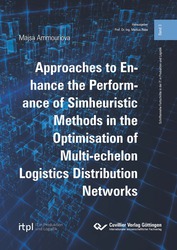| Fachbereiche | |
|---|---|
| Buchreihen (97) |
1381
|
| Nachhaltigkeit |
3
|
| Gesundheitswesen |
1
|
| Geisteswissenschaften |
2370
|
| Medienwissenschaften | 16 |
| Theologie | 57 |
| Philosophie | 102 |
| Rechtswissenschaft | 423 |
| Wirtschaftswissenschaften | 852 |
| Sozialwissenschaften | 417 |
| Sportwissenschaften | 48 |
| Psychologie | 233 |
| Pädagogik | 190 |
| Geschichtswissenschaften | 183 |
| Kunstwissenschaften | 111 |
| Kulturwissenschaften | 166 |
| Literaturwissenschaften | 117 |
| Sprachwissenschaften | 88 |
| Naturwissenschaften |
5407
|
| Ingenieurwissenschaften |
1798
|
| Allgemein |
98
|
|
Leitlinien Unfallchirurgie
5. Auflage bestellen |
|
Erweiterte Suche
Approaches to Enhance the Performance of Simheuristic Methods in the Optimisation of Multi-echelon Logistics Distribution Networks (Band 3)
Majsa Ammouriova (Autor)Vorschau
Leseprobe, PDF (240 KB)
Inhaltsverzeichnis, PDF (79 KB)
Management of logistics distribution networks is a challenging task. Decision-makers rely on logistics assistance systems that recommend actions to optimise the networks. These systems can be based on simheuristics to benefit from metaheuristics in exploring possible solutions and on simulation for modelling the networks. This book presents three approaches to recommend promising solutions to optimise the networks with fewer simulation runs. The first approach utilises information from the network to guide the search of metaheuristics. In this approach, domain-specific information is defined and assigned to actions. The metaheuristic algorithm utilises this domain-specific information to find more-promising solutions. The second approach is reducing the number of possible solutions by grouping actions with respect to their domain-specific attributes. Here, the smaller solution space decreases the number of required simulation runs. The last approach looks for equivalent solutions that cause the same changes in the network. This approach aims to skip unnecessary evaluations and, thus, simulation effort.
| ISBN-13 (Printausgabe) | 9783736974258 |
| ISBN-13 (E-Book) | 9783736964259 |
| Buchendformat | B5 |
| Sprache | Englisch |
| Seitenanzahl | 258 |
| Umschlagkaschierung | matt |
| Auflage | 1 |
| Buchreihe | Schriftenreihe Fortschritte in der IT in Produktion und Logistik |
| Band | 3 |
| Erscheinungsort | Göttingen |
| Promotionsort | Dortmund |
| Erscheinungsdatum | 11.05.2021 |
| Allgemeine Einordnung | Dissertation |
| Fachbereiche |
Statistik und Operations Research, Wirtschaftsmathematik
Informatik |
| Schlagwörter | Distributionsnetzwerke, Logistik-Assistenzsysteme, Simheuristiken, Metaheuristiken, Ökonometrie, econometrics, Regressionsanalyse, Paneldaten, Optimierungsverfahren, Logistics Assistance, Enhancement-Ansatz, Standort, Lieferant, Kunde, Lagerhäuser, Stock Keeping Units, Transportbeziehungen, transportation relations, transportation, entities, Entitäten, SKU-Zentralisierung, centralising an SKU, Lagerkosten, Lieferzeit, delivery time, storage costs, customer, suppliers, location, Simulation, Simulationslaufzeit, simulation run time, network, distribution, logistics, simulation, time, performance, Vertrieb, LAS, Suchraum, search space, Aktionsplan, action plans, Entscheidungsunterstützungssystem, decision support system, Evolutionärer Algorithmus, evolutionary algorithm, heuristische Einheit, heuristic unit, Unternehmensressourcenplanungssystem, enterprise resource planning system, quadratischer Fehler, square error, Selektionswahrscheinlichkeit, selection probability, Entscheidungsvariablen, decision variables, diskrete Ereignissimulation, discrete event simulation, Experiment, Aktionstypen, action types, multi-echelon logistics distribution network, Multi-Echelon Logistik-Distributionsnetz, Lieferketten, Knotenpunkte, nodes, Materialfluss, material flow, Informationsfluss, information flow, Überbestände, overstocking, Fehlbestände, stockout |








